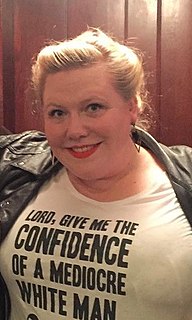A Quote by H. W. Brands
Some years ago, I read Thomas Carlyle's history of the French Revolution, and I was very taken by the way he told the story, and it seemed as though I was right in the middle of things. And it took me a while to figure out how he achieved that effect, and one of the ways was to write it in the present tense.
Related Quotes
I marvel now that it was not obvious how inextricable suffering and fear are. It was not until fear left that I noticed, slowly, how it seemed to have taken suffering with it. It took a while to figure out that (for me, anyhow) suffering is mostly caused by fear-not by the circumstances themselves, but by my response to them.
I've been doing short-form writing for a decade, and six years ago I signed with an agent, and we've been working on figuring out what my book would be. I was always so embarrassed that it took me so long to figure it out, but I think, in retrospect, I just wasn't ready to write a book six years ago. I wasn't confident enough as a writer and I wasn't coherent enough in my worldview. It just took this long for me to be a mature enough writer and be ready to do it.
The transformations of the French empire itself or of French power structures themselves as well as the emergence of a kind of language of equal rights starting with the American Revolution and the French Revolution provided an opportunity and in some ways connected with other kinds of ground level desires or hopes and ideologies for freedom that were coming out of the plantation regime itself.
There's this belief that some things can be taken seriously in an intellectual way, while some things are only entertainment or only a commodity. Or there's some kind of critical consensus that some things are "good," and some things are garbage, throwaway culture. And I think the difference between them, in a lot of ways, is actually much less than people think. Especially when you get down to how they affect the audience.







































